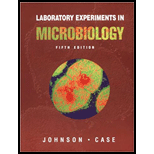Solutions for Symbiosis, Lab Experiments in Microbiology
Problem 4CT:
Where did the organisms in the infusions come from?Browse All Chapters of This Textbook
Chapter 1 - Use And Care Of The microscopeChapter 2 - Examination Of Living MicroorganismsChapter 3 - Microbes In The EnvironmentChapter 4 - Transfer Of Bacteria: Aseptic techniqueChapter 5 - Preparation Of Smears And Simple StainingChapter 6 - Negative StainingChapter 7 - Gram StainingChapter 8 - Acid-fast StainingChapter 9 - Structural Stains (endospore, Capsule, And Flagella)Chapter 10 - Morphologic Unknown
Chapter 11 - Isolation Of Bacteria By Dilution TechniquesChapter 12 - Special Media For Isolating BacteriaChapter 13 - Carbohydrate CatabolismChapter 14 - FermentationChapter 15 - Protein Catabolism, Part 1Chapter 16 - Protein Catabolism, Part 2Chapter 17 - RespirationChapter 18 - Unknown Identification And Bergey’s ManualChapter 19 - Oxygen And The Growth Of BacteriaChapter 20 - Determination Of A Bacterial Growth Curve: The Role Of TemperatureChapter 21 - BiofilmsChapter 22 - Physical Methods Of Control: HeatChapter 23 - Physical Methods Of Control: Ultraviolet RadiationChapter 24 - Chemical Methods Of Control: Disinfectants And AntisepticsChapter 25 - Chemical Methods Of Control: Antimicrobial DrugsChapter 26 - Effectiveness Of Hand ScrubbingChapter 27 - Regulation Of Gene ExpressionChapter 28 - Isolation Of Bacterial MutantsChapter 29 - Transformation Of BacteriaChapter 30 - Dna FingerprintingChapter 31 - Genetic EngineeringChapter 32 - Ames Test For Detecting Possible Chemical CarcinogensChapter 33 - Fungi: Yeasts And MoldsChapter 34 - Phototrophs: Algae And CyanobacteriaChapter 35 - ProtozoaChapter 36 - Parasitic HelminthsChapter 37 - Isolation And Titration Of BacteriophagesChapter 38 - Plant VirusesChapter 39 - EpidemiologyChapter 40 - Koch’s PostulatesChapter 41 - Innate ImmunityChapter 42 - Agglutination Reactions: Slide AgglutinationChapter 43 - Agglutination Reactions: Microtiter AgglutinationChapter 44 - Elisa TechniqueChapter 45 - Bacteria Of The SkinChapter 46 - Bacteria Of The Respiratory TractChapter 47 - Bacteria Of The MouthChapter 48 - Bacteria Of The Gastrointestinal TractChapter 49 - Bacteria Of The Genitourinary TractChapter 50 - Identification Of An Unknown From A Clinical SampleChapter 51 - Rapid Identification MethodsChapter 52 - Microbes In Water: Multiple-tube TechniqueChapter 53 - Microbes In Water: Membrane Filter TechniqueChapter 54 - Microbes In Food: ContaminationChapter 55 - Microbes Used In The Production Of FoodsChapter 56 - Microbes In Soil: The Nitrogen And Sulfur CyclesChapter 57 - Microbes In Soil: BioremediationChapter A - Appendix A PipettingChapter B - Appendix B Dilution Techniques And Calculations
Sample Solutions for this Textbook
We offer sample solutions for Symbiosis, Lab Experiments in Microbiology homework problems. See examples below:
A light microscope uses two lenses, objective and condenser lenses, for magnifying the sample under...Chapter 2, Problem 1QChapter 3, Problem 1QChapter 4, Problem 1QChapter 5, Problem 1QChapter 6, Problem 1QChapter 7, Problem 1QChapter 8, Problem 1QChapter 9, Problem 1Q
Chapter 10, Problem 1QChapter 11, Problem 1QChapter 12, Problem 1QThe iodine test is the used to test the presence of starch. The starch turns the aqueous solution of...Chapter 14, Problem 1QChapter 15, Problem 1QChapter 16, Problem 1QReduction is the process of gain ofelectrons by a chemical moiety. This results in the lowering of...Chapter 18, Problem 2QChapter 19, Problem 1QMicroorganisms are adapted to survive in a wide range of temperatures. Temperature plays a crucial...Naturally it is difficult to find a biofilm containing a pure culture. A biofilm grows by attracting...Autoclaving is a moist heat sterilization method that uses high-pressure steam. This process works...Chapter 23, Problem 1QChapter 24, Problem 2CTChapter 25, Problem 1QChapter 26, Problem 1QChapter 27, Problem 1QThe anabolic mutants are not able to use thechemicals present in the glucose minimal salt media to...Chapter 29, Problem 2QChapter 30, Problem 2QNatural transformation helps bacteria to gain an extra-chromosomal copy of DNA, called a plasmid...Chapter 32, Problem 1QChapter 33, Problem 1QChapter 34, Problem 1QChapter 35, Problem 1QThe humans serve both as an intermediate host (larvae in the muscle) and a definitive host (adult...Chapter 37, Problem 1QA viral infection is either localized or systemic depending on if it is limited to the affected area...Chapter 39, Problem 2QChapter 40, Problem 1QChapter 41, Problem 1QChapter 42, Problem 1QChapter 43, Problem 1QChapter 44, Problem 1QChapter 45, Problem 1QBlood agar is composed of defibrinated sheep blood, sodium chloride and nutrient agar. Based on the...S.salivarius makes use of the polysaccharides and gives rise to gum-drop colonies like blue ring....The gram negative rods that is oxidase-negative and that which ferments lactose can be subjected to...MacConkey is a differential solid media used for the isolation of enteric gram-negative bacteria...In clinical microbiology labs, clinical susceptibility testing is done for the isolated organism....Bacteria are generally divided into two categories, gram-negative and gram-positive bacteria. The...If the water sample gives negative result for Vibrio cholerae, then it does not means that the...A colony can be defined as a visible mass of microbes that all originate from a single mother cell....Chapter 54, Problem 1QChapter 55, Problem 1QThe given amino acid is cysteine, whose molecular formula is C7H7NO2S. Ammonification process of...An enrichment media is media that contain nutrients that are specific and hence, essential for the...The micropipettes used in the laboratories are of three different sizes, P20, P200, and P1000. P20...Chapter B, Problem 1P
More Editions of This Book
Corresponding editions of this textbook are also available below:
EBK LABORATORY EXPERIMENTS IN MICROBIOL
11th Edition
ISBN: 9780134024431
Laboratory Experiments in Microbiology (11th Edition)
11th Edition
ISBN: 9780321994936
EBK LABORATORY EXPERIMENTS IN MICROBIOL
11th Edition
ISBN: 8220101335272
EBK LABORATORY EXPERIMENTS IN MICROBIOL
12th Edition
ISBN: 8220106795194
Laboratory Experiments in Microbiology (12th Edition) (What's New in Microbiology)
12th Edition
ISBN: 9780134605203
EBK LAB.EXPER.IN MICROBIOLOGY-LAB.MAN.
12th Edition
ISBN: 9780134702575
Pearson eText for Laboratory Experiments in Microbiology -- Instant Access (Pearson+)
12th Edition
ISBN: 9780137546503
EBK LABORATORY EXPERIMENTS IN MICROBIOL
12th Edition
ISBN: 9780134644264
Laboratory Experiments In Microbiology
10th Edition
ISBN: 9780321794383
Related Biology Textbooks with Solutions
Still sussing out bartleby
Check out a sample textbook solution.
